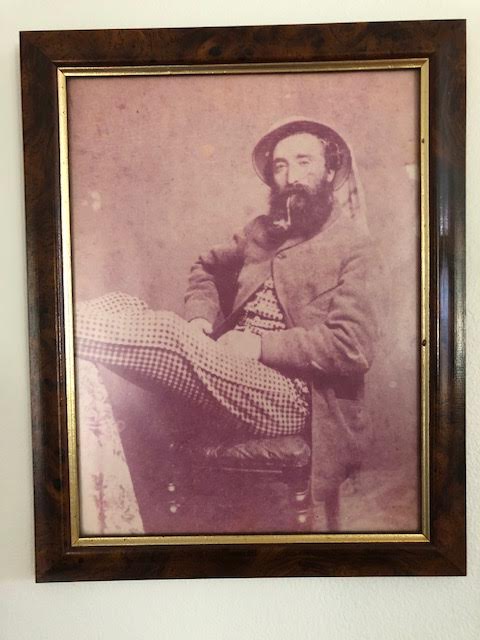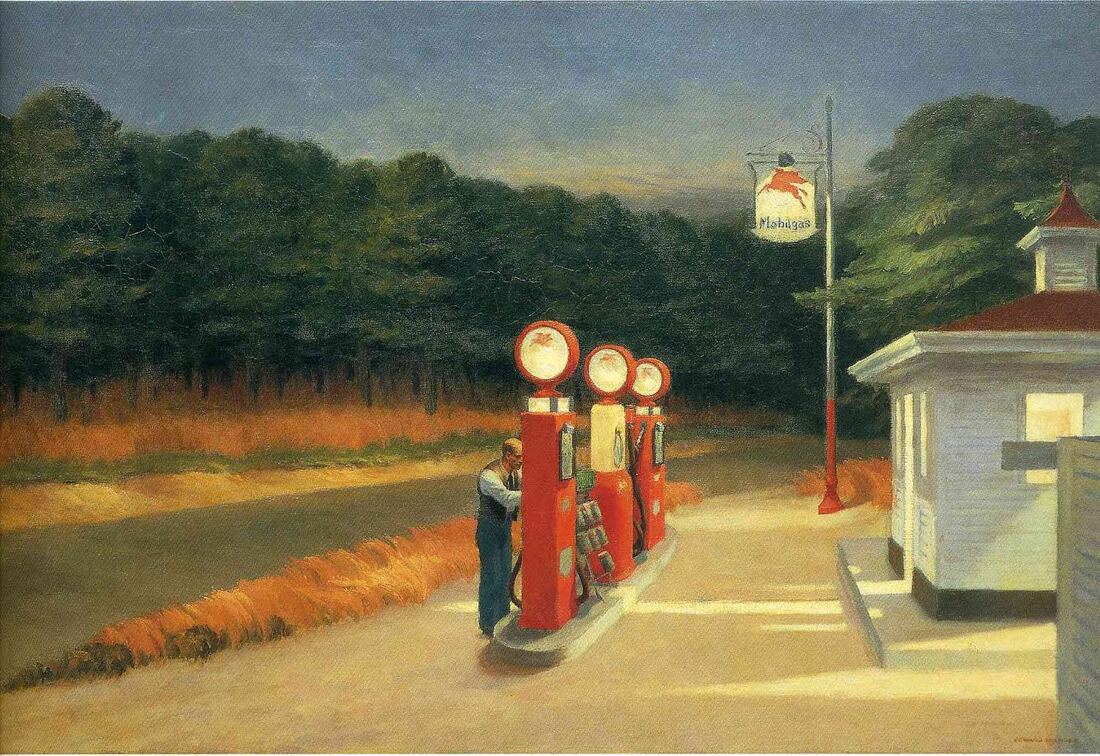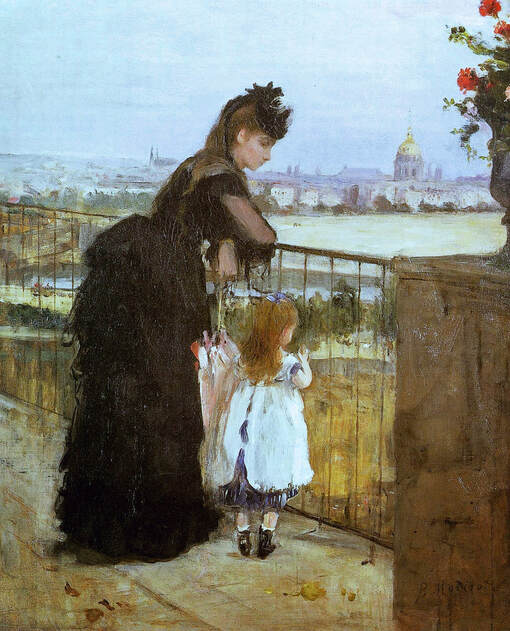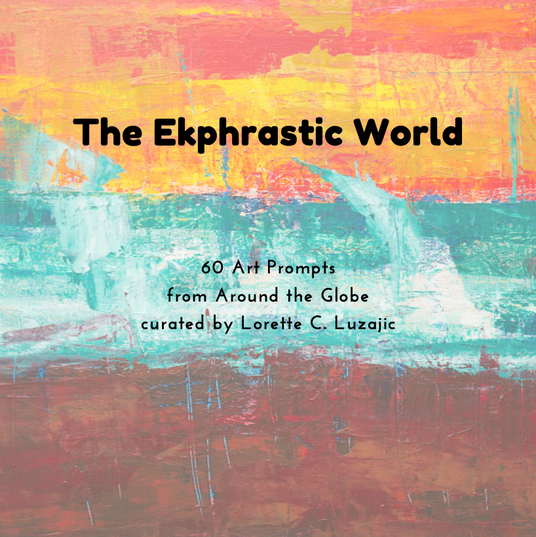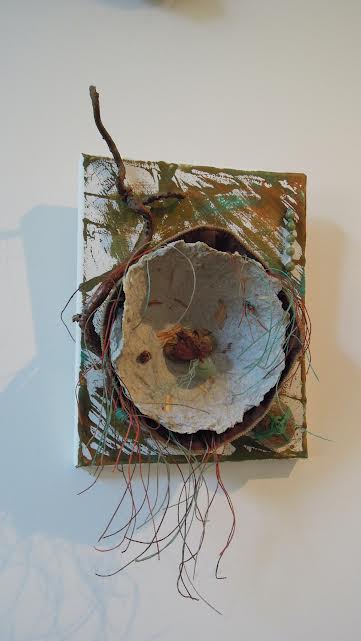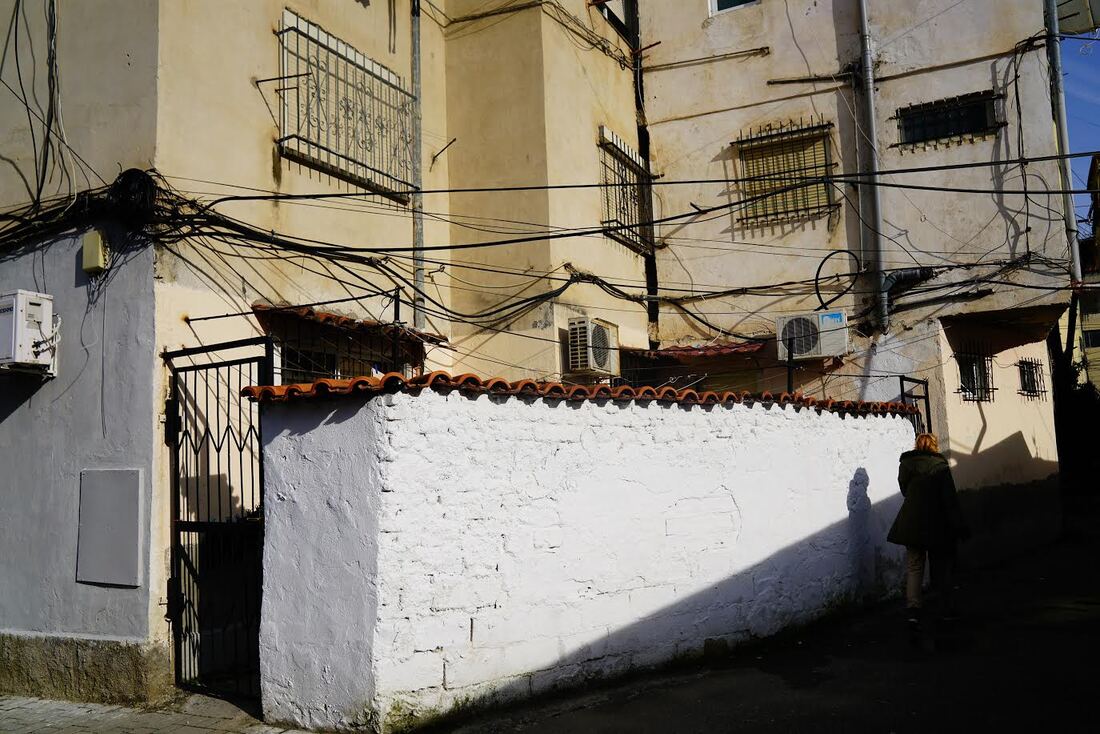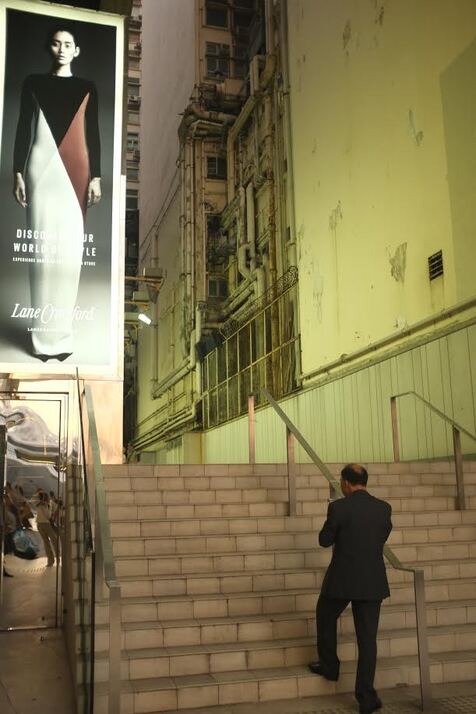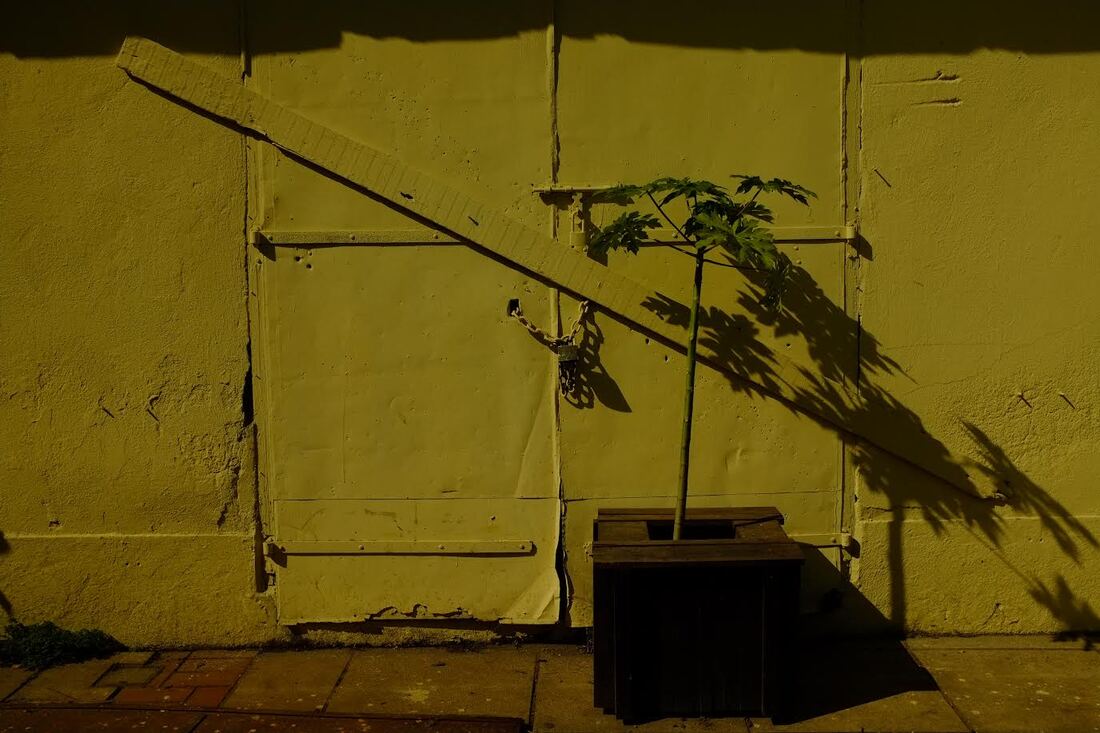|
Ode to Vivian Maier (Self-Portraits) 1. Mercurial, this mirror magic self-taught, self-caught Street witness, a crystal ball between her legs, her likeness, like she’s giving birth to her- self- portrait. 2. Here’s one: department store window shoppers, all of us, in a hall of glass and shadow: Now you see her, now you don’t. She’s everywhere and nowhere… an image, breathing in the air of others and otherness. There she is again: upside down inside the cigarette dispenser, in the industrial fan, at a cozy table for two (make that three), a shy couple caught in the folds of her housecoat. 3. She’s a gumshoe sleuth, a detective of perspective on the trail, on the move, her evidence evolving in the slimy tray of stop bath. Then it’s back to the office. You’ll see that dame’s shadow through the pebble-frosted glass before you see her. 4. Shadows on a cave wall: a high heeled shoe, a handbag, a garbage can in a blind alley. Or, shadows on a wave calls: in this one a horseshoe crab over her shadow heart, its tail pointing to a piece of driftwood, with a rusted nail driven through: the residue of someone else’s crucifixion. 5. Oh, Vivian, your fixation with your shadow Self – your nanny props: the bicycle, the carpet bag, the sunhat, the umbrella, ready for any contingency to countenance a snarling cat, your penumbra on the patina of a silver platter, a shiny hub cap nabbed in the glint of chrome, a rear-view mirror, a yard sale sign, running your length- wise shadows, against the wash of Lake Mich. Beaches and night-stand leavings, books, Teacups, curios, a field of buttercups, finding Light even in street litter by shoplifting the sheen from beauty parlour windows. John S. O'Connor John S. O'Connor: "I am a public school teacher outside Chicago and an adjunct professor at Northwestern University. I have written two books on the teaching of writing (Wordplaygrounds, and This Time It’s Personal), two books of haiku and a chapbook of poems called Rooting. I am finishing my debut collection Streets and Sanitation which will come out next year. I have written essays and book reviews for places like Colorado Review, Harvard Review, Michigan Quarterly Review, and Ploughshares, Stoneboat, and Under the Sun. Recent essays of mine have been named Notable in Best American Essays and Best American Sportswriting."
0 Comments
Edouard Etienne Levier Glazed eyes sunk under squid lids Cannot fit me, the watcher Keen to make curious sense, of you This gaudy pale dilettante Together we share a name along the line Alone in an empty room full of secrets No experience, nor custom, nor thought The same to recognize or cast on I persevere, squatting on my perch Hypnotised by the mystery of identity Peering hungrily close at an Other Tricked up in check like Sherlock The linguist who became, of all things A hatter and maybe even, so they say Before Melbourne, a gun runner Wrapped in velvet, I suspect Unnoticed like Rimbaud Worshipped at the ancestral shrine Are you idol, conscience, hero Mockingbird rival? I am swaying blind Were you thinking of me, as I of you? Waiting for a shot of recognition Blast of cognition, flash of intuition Until that revelatory moment When the model blinks back Everyone else freezes, you Remain as you knew you would be Deliberately mute and yet Did you wonder, who will remember? Who will gaze on your impassive face In the sorry future? Neither knows who the other might be Am I what you wished we might become? Nothing, I got nothing But I do know one thing about you Something you would never see In absentia you are tangibly present Unlike after you looked back at the lens Frozen ponce feet up in that soft chair Contrived amid brazen sangfroid Ed Southorn Ed Southorn is a Queensland writer interested in the anthropocene, social spatialization and cultural history. He was a newspaper reporter in Australia and England for 30 years. He has an MPhil in Creative Writing (non-fiction) and recently submitted a PhD in journalism and sociology. He teaches journalism and public writing at Griffith University and the University of Queensland. His most recent poems have been published in Meniscus and The Blue Nib. A Buck and Two Bits Auburn, Massachusetts, June 1933 A buck and two bits. yesterday was two-ten, the day before, three evens, the day before that most nearly five, but that was those wedding cars bound for Fitchburg up from somewhere south, hadn’t checked the needle past Pawtucket. Lucky I was here, they said. Half-drunk. A buck and two bits and it could have had six appended… those kids, girls, twins I’d say, agitating for a Payday bar apiece, and I was on the point of being glad the guy had honeyfuggled me with two promo boxes, but the mother she hushed them good, and their station wagon was just whitewalls in dust, and there was me holding the bars like God’s own doofus. Slaps instead of chocolate. Pretty much the way. A buck and two bits and pump three is still kicking, blockage or air in the feed. I’ve told the Company, been waiting on their promised guy since before Labor Day, and anyway their sole and present focus is phoning daily, sometimes twice, Sir, it’s Gene from Global again, just seeing how the figures do seem to be laying themselves out. Like the phone bouncing the cradle is going to magic the odds. A buck and two bits and the oil-rack’s rusting up, third one since Christmas, and the side-roof won’t felt itself. I work along, setting the nozzles, feeling the day’s farewell at my back. Soon time for the last of the tenderloin, then that broadcast the woman with the girls was giving out about, Roosevelt going all Caesar-voiced. Again. Strength in boondoggling, new worlds at dawn, that beautiful day beyond the blue horizon. A buck and two bits. I set the last nozzle. Less and less I take in the trees across the road. Every night, it feels, they drag a yard closer. Too much like a ruck of the faceless. Too much like the dead of the Marne. The Payday guy, though, he left me a three of Pabst. And I’ll have one of his bars, hell, two, on behalf of those sad little whupped little girls. Charge them to Gene from Global. Michael W. Thomas Boondoggling: a government project that wastes time and resources, associated, often unfairly, with initiatives during Roosevelt’s New Deal era (1933-39). The Marne: the Second Battle of the Marne (July-August 1918), in which US troops were involved. Pabst: one of America’s best-known beers, established in Milwaukee in the 1840s. Michael W. Thomas lived for several years in Canada and now lives in Worcestershire UK. He is a writer, musician and singer. His latest poetry collection is The Stations of The Day (Black Pear Press, 2019). www.michaelwthomas.co.uk Join us for biweekly ekphrastic writing challenges. See why so many writers are hooked on ekphrastic! We feature some of the most accomplished, influential poets writing today, and we also welcome emerging or first time writers and those who simply want to experience art in a deeper way or try something creative. The prompt this time is Woman and Child on a Balcony, by Berthe Morisot. Deadline is August 7, 2020. We are so pleased to have our longstanding contributor Alarie Tennille as guest editor for this challenge! Alarie has been a guest editor before, and she is a valued member of our prize nomination committee, as well as a recipient of the first annual Fantastic Ekphrastic awards here at The Ekphrastic Review. Welcome, Alarie! Message from Guest Editor Alarie Tennille Hello, Writers. Knowing how much fun it can be to write for these ekphrastic challenges and how you will stun me with variety, I’m already excited. Last year I selected an Ancient Egyptian Funerary Boat for your inspiration. This time I went in a very different direction. Recently I was invited to give a Zoom reading of my ekphrastic poems. The host asked me to begin by talking about my experience as a coed pioneer at The University of Virginia. I entered in 1970. Many people today are shocked that the school was that late accepting women, but Princeton went coed just one year before. Since I’d been the only girl in my high school trig class with no problem, I was shocked by the ugly response I got when I first arrived. The men in my own class were fine, but some upper classmen and faculty members felt it necessary to walk up to a small, shy girl and say, “We don’t want you here! You’re destroying our tradition. Thomas Jefferson didn’t found a school for girls.” Most infuriating was, “I voted against letting you come.” Why should they have had a vote about my civil rights? The court decided. I dug through old memories to share some of the most outlandishly sexist comments in the classroom. In my art history class on French Impressionism, the instructor told us that Mary Cassatt was the ONLY woman worth mentioning and that she only painted subjects interesting to women like moms with babies. “Not like the manly subjects of flowers and ballerinas painted by the male Impressionists,” I thought. At no time did he mention the many restrictions placed on women back then. They were not allowed to study art with the men, take life drawing classes, paint nudes, etc. Nor were they generally able to go roaming out alone to paint. But only in the last decade have I learned about more of the women artists overlooked through the centuries. Today is my chance to give Berthe Morisot the attention she deserves. I chose Woman and Child on a Balcony because I immediately saw four different ways to approach a poem. I didn’t bother looking for more, because I know you’ll surprise me. Alarie The Rules 1. Use this visual art prompt as a springboard for your writing. It can be a poem or short prose (fiction or nonfiction.) You can research the artwork or artist and use your discoveries to fuel your writing, or you can let the image alone provoke your imagination. 2. Write as many poems and stories as you like. Send only your best works or final draft, not everything you wrote down. (Please note, experimental formats are difficult to publish online. We will consider them but they present technical difficulties with web software that may not be easily resolved.) Please copy and paste your submission into the body of the email, even if you include an attachment such as Word or PDF. 3. Have fun. 4. USE THIS EMAIL ONLY. Send your work to [email protected]. Challenge submissions sent to the other inboxes will most likely be lost as those are read in chronological order of receipt, weeks or longer behind, and are not seen at all by guest editors. They will be discarded. Sorry. 5.Include MORISOT WRITING CHALLENGE in the subject line. 6. Include your name and a brief bio. If you do not include your bio, it will not be included with your work, if accepted. Even if you have already written for The Ekphrastic Review or submitted other works and your bio is "on file" you must include it in your challenge submission. Do not send it after acceptance or later; it will not be added to your poem. Guest editors may not be familiar with your bio or have access to archives. We are sorry about these technicalities, but have found that following up, requesting, adding, and changing later takes too much time and is very confusing. 7. Late submissions will be discarded. Sorry. 8. Deadline is midnight, August 7, 2020. 9. Please do not send revisions, corrections, or changes to your poetry or your biography after the fact. If it's not ready yet, hang on to it until it is. 10. Selected submissions will be published together, with the prompt, one week after the deadline. 11. Rinse and repeat with upcoming ekphrastic writing challenges! 12. Please share this prompt with your writing groups, Facebook groups, social media circles, and anywhere else you can. The simple act of sharing brings readers to The Ekphrastic Review, and that is the best way to support the poets and writers on our pages! This month, The Ekphrastic Review turned five. To celebrate this milestone, we have compiled a special collection of art prompts from dozens of countries around the world. This special ebook is $20 CAD (approx. $15 USD). It is a gift of support to The Ekphrastic Review, and a collection of 60 art prompts curated to expand and inspire your ekphrastic practice. Everyone who purchases this project can submit 15 poems inspired by the art within, or five short stories or essays, to our upcoming anniversary anthology ebook! Those submissions are due November 1. Instructions are in the ebook. From the bottom of our hearts, we thank you for supporting The Ekphrastic Review. Click on image to purchase ebook, or click here. You can also get the ebook Fifty Ekphrastic Approaches, which gives you fifty different ways to practice ekphrastic! Annunciation The brightest, the easiest? The first few moments. No vomiting, no leaking, no drip-drop when you sneeze. No fluids to worry you— is it blood, wrong time. The moment when no one knows not even you. I hate women who say they know exactly when their child was conceived, like a stenographer lying down recording the act, the firing right on target. It seems a dirty boast. It bugs me they want to log the coronation moment. Where was I exactly that I didn’t notice the rush, feel the thunderclap’s slice? Now, I’m hanging upside down like Rembrandt’s ox. My muscles softening, I grow tender. Suspension transforms my carcass into an embryo’s bonnet. Don’t run out of me. Envy Mary her notice. I got none. Buffy Shutt Buffy lives in Los Angeles where she writes poetry and fiction. A two-time Pushcart and Best of the Net nominee, her work appears in Lumina, Whatever Keeps The Lights On, Rise Up Review, Dodging the Rain, Split Lip Magazine, Anthropocene. She was awarded the Cobalt Review’s prize for their baseball issue. A Wrapping and Unwrapping (for Christo: 1935-2020) Greats and former greats beneath shrouds, Roman walls, the Reichstag, the Pont Neuf, returned to us in membrane, cauled, history a wrapping and unwrapping of what we think we know, geologic features we assumed tamed, mapped and bridged, measured and sounded, transformed as if by witchery, monuments enchanted for weeks while we wandered them dazed, stepping hesitantly out on the artist’s pier, trying to steady ourselves as we followed his vision, his fabric gates whispering, our faces tipped upwards like the leaves of his swaddled trees, peering at the suddenly unfamiliar light, wondering where and what we’ve come to. Devon Balwit Devon Balwit sets her hand to the plough in the Pacific Northwest. Her poems and reviews can be found here in The Ekphrastic Review as well as in The Worcester Review, The Cincinnati Review, Tampa Review, Rattle, Apt (long form issue), Tar River Poetry, Sugar House Review, Poetry South, saltfront, and Grist among others. Please visit her website at: https://pelapdx.wixsite.com/devonbalwitpoet Lewis Morley's Photograph of Christine Keeler Sitting the Wrong Way Round on a Copy of a Arne Jacobsen Chair (UK) 1963. The back turned to us (the chair’s), the uncertain slant of light, reveal and conceal, to a thirteen year old boy’s delight, hints at what had happened in the infamous honey trap. Elbows hide her boobs, no shins shown, shadowed darkened kneecaps, through a rough cut off-center handhold, almost worth the view, a bit of bare belly. But even that is shadowed too. Quaint now. That was a different time, a different world. The chair, the winner, became more an icon than the girl. Paul Jones Paul Jones’ poetry has been published in Poetry, Snapdragon: a Journal of Art and Healing, and in anthologies including Best American Erotic Poems (1800 - Present). Recently, he was nominated for two Pushcart Prizes and two Best of the Web Awards. His chapbook is What the Welsh and Chinese Have in Common. A manuscript of his poems crashed on the moon’s surface April 11, 2019. Valve after Fernand Léger Plumb the undergirding : underbelly : make known a thing or two : to know full well the heave and the swell, foam tip body of all waters, and make it, give it flow : to put form forth, make round : chute : pump fluid through : the forms of meat, of metal, the full rounded forms, the squelch and the sheen : infused : long hollows of piping, pipelines, elbowed to return the waters : beneath tubs, gleamy, filled at the turn of a whim in a gush from the stem of faucet : piping hot water to sluice the trunk, button bellied frame sucking a pipe : drinking in a print on the wall beside the fogged mirror : a painting a tunnel of squeezed paint, canal of colour : four cyclists, their bicycle pipe and rubber : outlined bold as font : how the bell on a bar is the bell at the tip of the stem of a flower, gripped by the hand like a beer heady with foam from the tap : such a perplexity of plumbing, fit together, fused underneath : how to paint slang and windpipe, vent fumes : and to weld from all of it a fuselage, a fountain : the tuba undergirding a swell in the tear ducts. Fernand, two or three tubes stay plugged. All tubes two-way : swollen and fit to burst. William Repass William Repass lives and works in Pittsburgh, PA. His poetry has appeared in Bennington Review, Denver Quarterly, Hobart, Small Po[r]tions, Threadcount, and elsewhere. His critical writings can be found at Full Stop, Colorado Review, and Flock. This photo is the first in a stack of seventeen that I received in an envelope with no return address except “Passing By.” To understand them and why I received them, I need to be certain who sent them. I think probably Kara, the news photographer I lived with until recently when she put her belongings in storage and walked away with two suitcases. I haven’t heard from her in three months. That figure could be her passing by this ugly scene with its closed doors and barred windows, or maybe Kara took this shot. The dying people I used to escort on Terminal Tours took a lot of selfies, but they have passed on so I’m sure they didn’t send me these photos. I’ve ruled out my former wife, Ann, because she always said I was “just passing through.” The big brother who never tired of instructing me passed away a few years ago. My lawyer daughter is too proud to ever pass herself off as anonymous. The sender could, of course, be a stranger, and the photos could be a gift, maybe even some fan’s stimulus to quit writing this blog and to continue writing my Michael Keever memoirs with “passing” in their titles. But the photos seem more like a test than a gift. As a former pro basketball player, I believe—still—that life is motion. A photo--even one like this that snaps a person in motion—is a still life, a contradiction in terms to me. But when you get a mysterious message in a bottle, you can’t help but look and maybe even try to learn the language of the message. Another person passing by, closer up this time. Like the woman in the first photo, the man seems to be passing through, oblivious to his surroundings. He appears to pay no attention to the blandishments of the photographed woman in the upper left and no attention to the complicated ugliness of barred openings in the upper right. The way he is holding his arms, he may be looking at his cell phone. He is surely unaware of the photographed figure in the lower left, who is — if you look closely or magnify — a reflection of the photographer taking this shot. The woman is not Kara. The woman is not a person I know. Forget about solving the mystery of taker and sender. “Keep it simple, Keever,” my high school coach used to say. What is it that I see? The man is shot moving like a player, he may be ignoring his setting as I often do, but I have more hair. Studying this person who is not me, I realize every photo is ultimately impersonal, a thing — even if it’s a portrait of you by someone you know. A photo is first and last a dead thing, still on paper, still in its digital home. That man will never take the next step. That stillness is the primal ugliness I resist in photos, their unpleasant reminder of the Terminal. That understood, maybe I can learn to appreciate what doesn’t move. Of all the photos, this one near the end of the sequence should most frustrate me, the “me”—the former athlete--who began this narrative. No people or motion here. Passage is most certainly blocked: closed, locked, and sealed by that angled board, reinforced with panels at the bottom, painted the same colour as the wall to either side, fronted by a plant, spindly in itself but occupying what appears to be an oversized and heavy box. If doors are closed, windows are shuttered, passageways dead ended--no entrance, no exit--then what do I do with my tropism to pass through or see through? I can, of course, simply pass by. This photograph and others imply — I surprise myself by realizing now — that I should instead pause by such scenes, such photos. Find beauty in closure, in the shadow larger than the plant that casts it. Or find pleasure in incongruity, the overdetermination of the closure versus the ineffectualness of the plant. Or find solace in nature surviving, even in the least likely of places. Or find engagement with something that is utterly not me, does not reflect me, is not in motion, will never be in motion. All these sentences that begin with “or” admit that I’m uncertain. And I’ve come to believe that uncertainty is the desired effect of photos, not just great ones but all photos, for no matter how clearly focused the photo is we never know what was not taken, what was outside the frame, and therefore we realize that even the most documentary photos are like verbal fictions, selective excerpts from all that could be written. Given the vagaries of language, what you have been reading could be an unreliable fiction reflecting on uncertain photos, mirroring them. “Passing By” might be a reminder—playful I hope you will agree--of the uncertainty I believe every viewer of photographs should accept and even cherish. We are all passing through this world. But do not pass by the uncertain world. Do not pass by photos that don’t stop you in your tracks. Until all is still, why not enjoy uncertainty, how photos and stories both demonstrate that the world is not settled and fixed, not closed and locked--like the door here, like the windows in that first image, like the openings in the second image--to imagination? Tom LeClair These excerpts are from Passing By, a much longer photo/fiction collaboration between Kinga Owczennikow, whose photos have appeared in group shows all over Europe and in Vogue Italia, and Tom LeClair, whose four Passing novels have Michael Keever as putative author, narrator, and protagonist. Kinga Owczennikow has been a teacher in international schools in Asia and Europe, most recently in Albania. Tom LeClair is a professor emeritus at the University of Cincinnati, most recently residing in Brooklyn. The complete Passing By can be found here: https://medium.com/@tomleclair_73623/passing-by-1e002f2b53db |
The Ekphrastic Review
COOKIES/PRIVACY
This site uses cookies to deliver your best navigation experience this time and next. Continuing here means you consent to cookies. Thank you. Join us on Facebook:
July 2024
|
